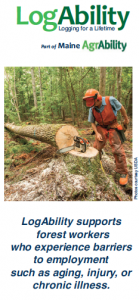LogAbility Provides Recommendations for Maine Loggers
 By Brie Weisman, Occupational Therapist with Maine LogAbility
By Brie Weisman, Occupational Therapist with Maine LogAbility
Also published by Loggers Voice
- Have you developed arthritis in your hands that compromises your ability to grip tools, but are otherwise healthy and strong and wish to continue working?
- Have you become less flexible over the years, where you can’t turn to look directly behind you or your equipment anymore?
- Are you in pain and know it’s compromising safety?
- Do you have an aching back, sore shoulders, or knees that don’t bend as easily as they used to?
LogAbility is a program, providing answers to questions like these. There are no-cost and low-cost effective ways to address these issues so that you can continue to work.
LogAbility is a program of Maine AgrAbility, specifically for production agriculture workers in Maine focused on the logging and forestry industries. Maine AgrAbility is a USDA-funded program of the University of Maine Cooperative Extension whose mission is to serve farmers, fishermen, and forest workers in Maine overcome disabilities, injuries, or other barriers to continue to work safely and successfully.
LogAbility can provide connections to networks and resources to assist loggers to continue working safely and efficiently. LogAbility is able to provide on-site visits by staff who are occupational therapists (OTs) to discuss specific situations and make general recommendations of adaptive equipment or techniques. OTs are professional health care providers trained in analyzing work tasks and work patterns and can suggest modifications to work tasks, tools, and equipment to suit the specific needs of individual workers.
There is no fee to use this service. If you or someone you know would benefit from LogAbility, please reach us at extension.umaine.edu/agrability.
LogAbility will be providing routine articles in this news outlet. Future articles will feature aging, specific diseases, conditions, and common injuries that can be best addressed by loggers at work. Injuries highlighted will include chronic soft tissue injuries like rotator cuff injury, back sprains and strains, bursitis, and tendonitis, as well as acute injuries like traumatic brain injury, amputation, and spinal cord injuries. Diseases such as diabetes, cardiovascular issues, chronic obstructive pulmonary disease, and obesity will also be addressed.
These practical articles will also include interviews with workers in the logging industry whenever possible. If you’ve overcome an issue and think that you might be a candidate for an interview so that others can benefit from your experience, contact us at: maine.agrability@maine.edu.
